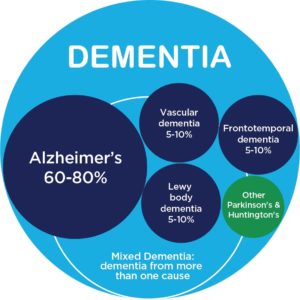Dementia Treatment & Care

What Causes Dementia?
Dementia is caused by damaged brain cells that interfere with the ability for other brain cells to communicate with each other. The brain is composed of several regions and when normal communication doesn’t occur, it affects these regions and a person’s thinking, behavior and feelings. Alzheimer’s disease is the leading cause of dementia.
Dementia Symptoms:
- Problems with short-term memory
- Keeping track of everyday items
- Remembering to pay bills
- Keeping track of appointments
- Everyday living skills
- Difficulty communicating or finding words
- Psychological changes
Types of Dementia
There are reversible and non-reversable forms of dementia. The most common reversable forms of dementia are infections and immune disorders, metabolic problems and endocrine abnormalities, nutritional deficiencies, side effects from medications, subdural hematomas, heavy metal poisoning, normal-pressure hydrocephalus, anoxia and rarely brain tumors. Alzheimer’s, Vascular, Lewy body dementia, Frontotemporal dementia, mixed dementia and some other disorders linked to dementia that are non-reversible.
Dementia Treatment – The Importance of an Early Diagnosis
There are many benefits to getting an early diagnosis of dementia. Getting an early diagnosis allows you to maximize your quality of life. It allows you to get nutrients you may be deficient in or the appropriate medication needed for non-reversible conditions like Alzheimer’s disease. It also allows you to gain access to the vast amounts of resources and support that is available. Getting an early diagnosis and dementia treatment also allows you and your family to understand the recent changes you have been experiencing and to better plan your future.
Dementia Conditions We Treat
We see several patients with neurological conditions. These are the specific conditions related to Dementia we most commonly treat:
- Alzheimer’s disease
- Frontotemporal dementia (FTD)
- Lewy body dementia
- Vascular dementia
Dementia Tests and Clinical Trials
We offer free memory screenings to assist in diagnosing dementia. We also participate in several clinical trials related to Alzheimer’s disease and Lewy body dementia and are connected to several resources that can be beneficial in managing dementia.



